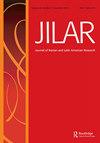阶级和性别角色:澳大利亚墨西哥高技能女性移民的叙述
IF 0.3
0 HUMANITIES, MULTIDISCIPLINARY
Journal of Iberian and Latin American Research
Pub Date : 2022-05-04
DOI:10.1080/13260219.2022.2069842
引用次数: 0
摘要
摘要:本文探讨移居澳大利亚墨尔本的墨西哥裔女性与阶级相关的性别角色体验。基于20名中高阶层和上层高技能墨西哥女性的定性研究数据,通过安提亚斯的易位性,运用交叉性棱镜,我们认为高技能墨西哥女性的移民/流动和定位适应的个人旅程带来了她们的社会阶级/地位和性别角色认同的变化。我们试图确定他们如何以及为什么重新评估,挑战或重新谈判他们的墨西哥阶级特权,作为专业人士和女性的角色,以及这些角色如何与澳大利亚的社会秩序相关。他们的经验叙述强调,在这种重新谈判中,大多数人都会遇到挑战。从参与者的角度来看,有些人已经重新协商了他们在家庭单位中的角色。在工作中,有些人觉得自己是专业人士,在这个空间里,他们能够培养一种深刻的能动性,并做出独立的选择。本文章由计算机程序翻译,如有差异,请以英文原文为准。
Class and Gender Roles: Narratives of Highly Skilled Mexican Women Migrants in Australia
ABSTRACT This article explores gender role experiences interconnected with class among women of Mexican origin who have migrated to metropolitan Melbourne, Australia. Drawing on qualitative research data from twenty middle high-class and upper-class high-skilled Mexican women, and using an intersectionality prism via Anthias’s translocational positionality, we argue that the personal journey of highly skilled Mexican women’s migration/mobility and located adaptation brings changes to their social class/status and gender role identities. We attempt to ascertain how and why they re-evaluate, challenge, or renegotiate their Mexican class privileges, roles as professionals and as women, and how those roles relate to Australian social ordering. Their experience narratives highlight that most go through challenges in this renegotiation. From the participants’ point of view, some have renegotiated roles within their family units. At work, some feel recognized as professionals in a space which enables them to develop a deep sense of agency and make independent choices.
求助全文
通过发布文献求助,成功后即可免费获取论文全文。
去求助
来源期刊

Journal of Iberian and Latin American Research
HUMANITIES, MULTIDISCIPLINARY-
CiteScore
0.60
自引率
0.00%
发文量
22
 求助内容:
求助内容: 应助结果提醒方式:
应助结果提醒方式:


